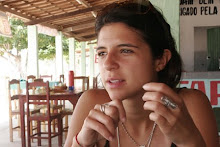I have a theory that every person, even the ones with very healthy eating habits, have a devil food that torments them. Perhaps it does not haunt them all the time, maybe once in a blue moon or, in my case, about twice a year.
My devil is brown and smooth. His name is Nutella.
In Spain, this item (made mostly of hydrogenated vegetable oil) is advertised as a great breakfast choice - Con Nutella, desayuna positivo. I could not imagine loading my body with this stuff first thing in the morning, after it has been through a crucial moment in its cleaning process, when the liver is running full speed to get rid of toxins. For breakfast I prefer real food, things like fruit, yogurt, oats and nuts. Those few times a year when I do load this stuff into me (when I am taken over by the devil?), I do it in the late afternoon and evening, usually when I have been at the computer for way too many hours. And, personally, I prefer to consume the devil spread thinly over dried toast. On anything else, it just doesn't taste the same to me.
I don't fully understand why I crave this stuff. All year, I am discusted by the mere sight of its strangely shaped jar, with a logo that starts with a black 'n', followed by the red 'utella,' with the 'll' leaving the paper completely (who thought of this?). But, for some reason, when the devil speaks and the craving arrives, I just can't seem to get enough of it. I read somewhere that highly fatty industrialized food-like products create a quasi-addictive effect in the body, sometimes generating a feeling of insatiability. It's the chip syndrome - you can't just have one. This time, what woke the devil was a tormentous cold. One evening I was fine, the next morning I was the personification of miserable. This cold kept me house-bound for a week and it was in the second day that I, with a high fever, decided to give in and walk five floors of stairs (I live in a pre-elevator building) to into the Paskistani shop to get my fix - at 10:30pm, by the way. Oh. I felt guilty putting on my shoes, opening the door, hearing my footsteps on the old tile stairs, and greeting the shopkeeper. I found the odd jars that Ferrero is so proud of in what was ironically the darkest corner of the shop. It was like a movie scene. I eyed one in particular and stared at it while there was an entire conversation going on in my head. Two distinct voices weighed the pros and cos of spending 2.99 euros on this glass jar full of devil. At the end of some long long minutes, I walked to the counter and, ashamed at my weakness, handed the jar and the money to a big-eyed man who didn't seem to understand my shame. Perhaps his devil is a different one.
The advertising says that Nutella does not need refrigeration. In fact, it stays 'fresh' for months right beside the honey in the kitchen shelf. Ironically (again), its more wholesome neighbor is made in a factory as well, where hundreds of dedicated bees spend their entire lives creating honey without any prospect of retirement. The non-refrigeration worries me incredibly. Yes, honey can stay out of the refrigerator because it has natural (and very good-for-you) anti-bacterial properties that preserve it for long periods of time. But what about something that is completely industrialized? I mean, Nutella's ingredients are as far from natural as they come. Preservatives and aromas created by people in lab coats. Yikes! What happens to this stuff at the celular level inside of me? This thought scares me and, oh, wait a minute! I think I find myself grossed out again about this thing. Fantastic! Now I can go back to my normal eating life, devil-free until, for some reason, it returns. Unannounced. But until then, real food please!!!








